Brex was one of the 20 companies that put their hat in the ring to acquire Silicon Valley Bank, or chunks of it, in March, newly-released Federal Deposit Insurance Corp. data shows.
The San Francisco-based neobank tried to buy some deposits and credit card accounts from Silicon Valley Bank when the bank was seized by the FDIC, Brex CEO Henrique Dubugras said in an interview. The deposits and card accounts were all held by early- and growth-stage startup clients.
Dubugras knew Brex's bid was a long shot because it isn't a bank and it wasn't aiming to buy all of Silicon Valley Bank, but the overlap of the two companies' focus on serving startups made the opportunity attractive to the neobank.
"We understand the community really well, and we thought we could serve it really well," Dubugras said. "We didn't bid for the winery or the private bank, or any of these assets that we don't understand. We only went for the ones we thought could do a really good job and keep the ethos of SVB."
Dubugras said that the acquisition of the early- and growth-stage portfolio would have brought customers and talent to Brex, but it would not have brought the company a bank charter.
Jonah Crane, a partner at the advisory and investment firm Klaros Group, said acquiring a portion of Silicon Valley Bank's deposits could have been an opportunity for Brex to accelerate its growth with the company's target customer base at a bargain price.
Raleigh, North Carolina-based First Citizens BancShares
Brex declined to disclose financial details of its offer, but Dubugras said the company planned to use cash on its balance sheet to buy the deposits and card accounts. He added that Brex was never in contact with the FDIC about the bid. The company decided to submit its pitch at the recommendation of a Brex customer who was also a customer at Silicon Valley Bank, Dubugras said. Brex's executive team put together the proposal, which was approved by its board.
Neobanks that serve startups
"We're not trying to win all the deposits," Dubugras said. "We want to be your operating account. We want to make all your payments, run your payroll and pay your bills because our software is really good at doing that. And if you want to keep a lot of money in our treasury, too, we have a product for that. But we really excel at simpler treasury use cases where you just want a money market fund, or day-to-day operation, like bill pay, wires, checks."
The CEO added Brex isn't interested in acquiring a bank charter the way some fintechs that focus on online lending like SoFi and LendingClub have done in recent years.
Klaros Group's Crane said it could make sense for Brex to try to acquire a bank charter, depending on its long-term strategy. When fintechs try to buy banks, they usually look for small, healthy community banks.
"Brex is offering banking services to customers as a nonbank, and they found some relatively creative structures to do that," Crane said. "But ultimately, they're not going to be able to be the core operational account or core banking relationship with their customers without a banking license. I think it's just too hard to run a core treasury and payments function for sizable commercial businesses as a nonbank."
Billions of dollars funneled into the two neobanks after Silicon Valley Bank failed. But fintechs may have to work hard to retain that business.
Dubugras said that Brex is still open to other potential acquisitions but is prioritizing internal investments. He added that distressed Silicon Valley Bank was a "very unique" situation because of its customer base's overlap with Brex's. There aren't many banks that have similar portfolios, except First Republic Bank, which was also based in San Francisco and served similar startup clients but failed Monday following a steep drop in deposit, he said. JPMorgan Chase bought all of First Republic's deposits and "substantially all" of its $229.1 billion of assets. Dubugras said Brex didn't have a chance to look at submitting a bid for First Republic.
Bloomberg News and Reuters reported at the time that the FDIC had asked banks to place bids the day prior, including PNC Financial Services Group, U.S. Bancorp, Bank of America and Citizens Financial Group. JPMorgan Chairman and CEO Jamie Dimon said his company had 800 people working to assess First Republic's books.
"Our government invited us and others to step up, and we did," Dimon said in a news release at the time. "Our financial strength, capabilities and business model allowed us to develop a bid to execute the transaction in a way to minimize costs to the Deposit Insurance Fund."
Crane said finding nonbanks able to take assets out of failed, or even healthy, banks could help the banking industry shore up capital positions. He added that he thinks if more banks fail, it will be easier for a nonbank to get in on the purchase action.
"Even if the vast majority of banks are reasonably healthy, they're all looking at the balance sheet, and they're all looking at the economic environment, and they're all getting a little risk-averse right now," Crane said. "It makes sense that you would want to attract capital from outside the banking system to provide part of the solution here. … JPMorgan can't buy everybody."







